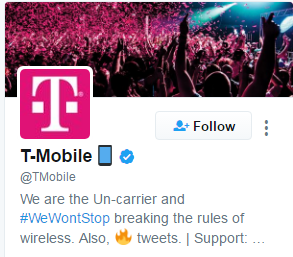Although it’s one of only four nationwide wireless carriers and has its corporate roots in a foreign state-run monopoly, T-Mobile fancies itself the brash outsider in the wireless marketplace. The company touts itself as the “Un-carrier.” It doesn’t play by the same rules as other wireless carriers, and it’s not afraid to say so.
Literally:

Pursuing that self-image can be a slippery slope, however. Like a teenage boy playacting at being a rebel by growing his hair out, wearing a leather jacket to class and stealing a car for a joyride, T-Mobile sometimes overdoes it. For example, T-Mobile was recently cited for marketing “unlimited” data plans while in reality throttling heavy data users and has also been the subject of recent stories alleging fraudulent, predatory cramming and upselling practices. One might suggest that the company has gotten a wee bit carried away with this whole “breaking the rules of wireless” thing.
T-Mobile also has a small problem with accuracy, or what some might call the truth. Let’s not forget that T-Mobile is the company that went to absurd lengths in stomping its magenta sneakers about the need for the Federal Communications Commission (FCC) to set aside spectrum in the incentive auction for everyone not named AT&T and Verizon, going so far as to come up with the world’s most pathetic superhero movie to try to make its point. According to T-Mobile, this set-aside was critical to prevent Verizon and AT&T from foreclosing the Un-carrier’s access to “low-band” spectrum.
Was it though? At the end of the day, Verizon and Sprint didn’t even bid in the auction, and AT&T barely scratched the auction’s surface, spending a fraction of what T-Mobile did. Oops. Our bad, guys.
Since no one seemed to notice that T-Mobile was full of, let’s say, “magenta,” T-Mobile figured it would raise its game. The company hired an economist to estimate how many stations would be repacked following the auction. Never mind that the economist in question was previously best known for predicting that wireless carriers would bid $84 billion in the incentive auction. Yes, that guy definitely had a lot of credibility.
Has anyone pointed out that T-Mobile and its trade association had it all wrong? Nope.
At this point, we are all almost daring T-Mobile to stay on its “Un-carrier” or “We-don’t-follow-any-rules” roll. As Charlie Ergen would say, as long as no one notices, why not go bigger, bolder?
Taking a page from the DISH auction playbook, T-Mobile’s CEO, John Legere, decided to blatantly ignore the FCC’s strict rules against talking about the auction results before the end of its official “quiet period,” and instead boasted about T-Mobile’s self-proclaimed success. While other bidders dutifully obeyed the FCC’s mandatory quiet period, T-Mobile figured that it had gotten away with just about everything else, so why bother containing its excitement.
We’ll see if the government has anything to say about T-Mobile’s willingness to flaunt its rules in this instance and whether the powers that be will finally catch on to T-Mobile’s pattern of “Un-following” the rules and playing fast and loose with “Un-facts.” Yes, the FCC should take experienced auction player T-Mobile to task for its plain violation of the rules. But the government should also take a moment to ponder the pattern and wonder just how much it can take T-Mobile at its “Un-word.”
What the FCC does next has important implications for broadcasters and their viewers across the country. T-Mobile’s latest project is to cram – no pun intended, I swear – down everyone’s throat a nearly wholesale reorganization of broadcast television stations in record time. Never mind if it relies on faulty assumptions and heavy handshakes and leaves underserved communities without access to over-the-air television or radio. Hey, rules are meant to be broken, right?
Trouble is, they aren’t. T-Mobile should be held to the same standard as everyone else. The FCC can no longer rely on T-Mobile’s now consistently dubious claims. The company has fallen in love with its Un-carrier status so much so that it believes the rules – the FCC’s, the Federal Trade Commission’s or the laws of physics – no longer matter. But the rules are there to protect American consumers, and we have little doubt this FCC will now enforce them.

